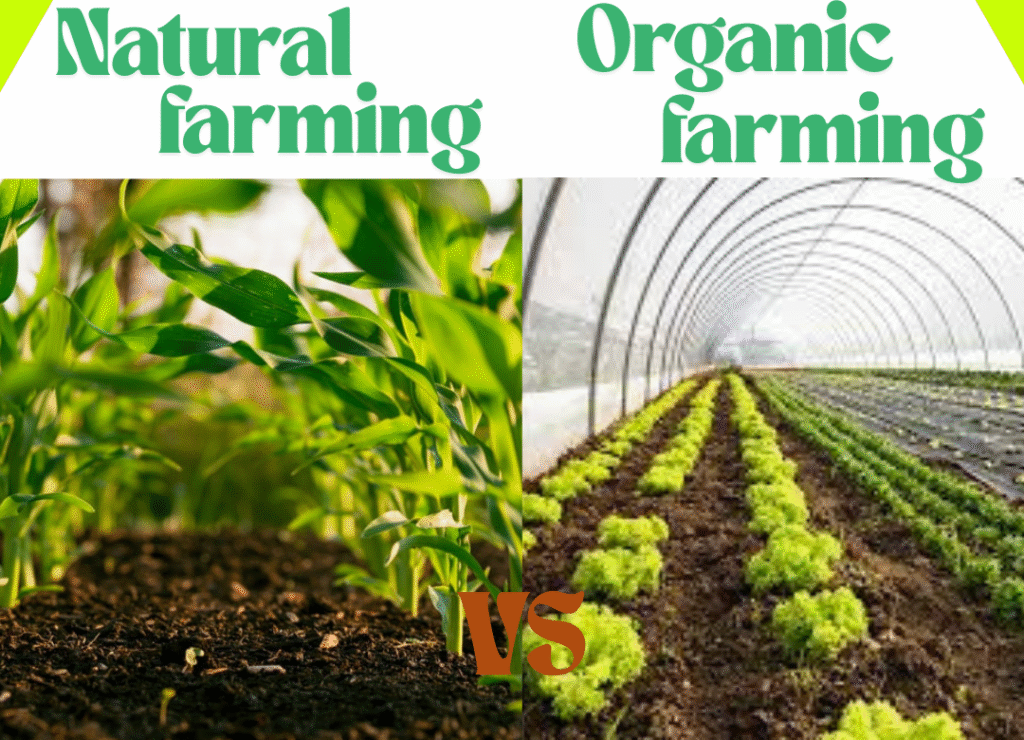
Over the past few decades, farmers and consumers have become more aware of the impact that agriculture has on health, the environment, and food quality. as awareness increases, the debate between natural and organic farming continues to gain momentum. While both approaches avoid harmful chemicals, their philosophies, practices, and outcomes differ significantly.
In this article, we’ll dive deep into the difference between natural & organic farming, explain what is natural farming, highlight the benefits of each, and help you decide which is better for the future of sustainable agriculture.
What is Natural Farming?
Natural farming is an agricultural method that avoids all synthetic and even organic inputs from outside the farm. Instead, it relies on natural processes, local resources, and minimal human intervention.
For example, in natural farming:
- Farmers use cow dung, cow urine, and compost prepared on the farm.
- Chemical fertilizers, pesticides, and even factory-made organic inputs are avoided.
- Crops are grown in harmony with local soil fertility, microbes, and biodiversity.
The most famous method of natural farming is Zero Budget Natural Farming (ZBNF), popularized in India, which emphasizes farming without depending on costly external inputs.
What is Organic Farming?
Organic farming, on the other hand, is a regulated farming system where farmers avoid synthetic fertilizers and pesticides but are allowed to use certified organic inputs such as bio-fertilizers, neem oil sprays, and organic manures purchased from the market.
Key principles of organic farming include:
- Maintaining soil fertility through crop rotation, compost, and green manures.
- Using biopesticides, organic-certified fertilizers, and natural predators for pest control.
- Certification standards governed by organizations like USDA Organic, EU Organic, or India’s NPOP.
Organic farming is more commercialized and standardized, making it widely accepted in global markets.
Difference Between Natural & Organic Farming
At first glance, both farming methods may seem similar, but when we look deeper, the difference between organic farming and natural farming becomes clearer.
Here’s a simple breakdown:
| Aspect | Natural Farming | Organic Farming |
| Inputs | Uses only on-farm resources (cow dung, urine, compost, mulching). | Allows certified organic inputs from outside sources. |
| Certification | No certification required; based on trust. | Requires strict certification (USDA, EU, NPOP). |
| Cost | Low cost, as no external inputs are purchased. | Higher cost due to certification and purchased organic inputs. |
| Market Reach | Limited to local markets, trust-based. | Widely accepted globally with premium pricing. |
| Philosophy | Farming in complete harmony with nature. | Farming without chemicals but with external organic support. |
This comparison clearly highlights the difference between natural farming & organic farming in terms of approach, cost, and commercialization.
Benefits of Natural Farming
- Cost-Effective: No need to buy fertilizers or pesticides.
- Soil Health: Restores microbial balance and improves fertility naturally.
- Environment-Friendly: Zero pollution, no chemical run-off.
- Sustainable: Focuses on local resources and reduces dependency.
Benefits of Organic Farming
- Certification and Market Value: Certified organic products fetch higher prices.
- Standardized Practices: Follow globally recognized farming methods.
- Consumer Trust: Certification ensures authenticity and quality.
- Better Market Reach: Accepted in domestic and international markets.
Challenges in Natural Farming
- Yields may initially drop when shifting from chemical farming.
- Lacks global recognition and certification.
- Depends heavily on livestock (for dung and urine).
- Limited scalability for commercial farming.
Challenges in Organic Farming
- Certification is expensive and time-consuming.
- Organic inputs from markets can still be costly.
- Requires regular monitoring and audits.
- Higher prices may not always be affordable for common consumers.
Natural vs Organic Farming: Which is Better?
The Organic vs Natural Farming debate doesn’t have a one-size-fits-all answer.
- For small farmers: Natural farming is more affordable, sustainable, and self-reliant.
- For commercial farmers: Organic farming offers better access to markets and premium pricing.
- For consumers: Both provide chemical-free food, but organic products are more regulated, whereas natural farming products depend on farmer-consumer trust.
Ultimately, the difference between organic and natural farming lies in philosophy. Natural farming is about being completely nature-reliant, while organic farming is about regulated, chemical-free practices that can fit into global trade.
Future of Sustainable Farming
As climate change, soil degradation, and health concerns grow, both natural and organic farming are seen as solutions to modern agricultural problems.
- Natural farming may become the go-to method for local, sustainable food production.
- Organic farming will likely continue dominating global certified markets.
Final Opinion
The difference between natural & organic farming is not just about techniques but about philosophies. Natural farming is rooted in self-reliance and harmony with nature, while organic farming is about regulation, certification, and market expansion.
For the future of agriculture, both methods are important. Together, they can create a healthier, sustainable, and eco-friendly food system that benefits farmers, consumers, and the planet.
Read Also : Organic vs Natural Farming Which Method Truly Heals the Soil?
Pingback: Differences Between Natural and Organic Farming